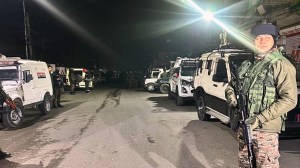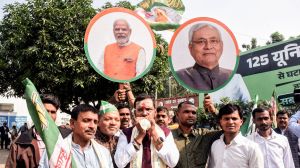In Libya,enemy turns ally
As Western powers back the new government thats taking shape in Libya,they could face an awkward relationship with Islamists like Abdel Hakim Belhaj.
ROD NORDLAND
Abdel Hakim Belhaj had a wry smile about the oddity of his situation.
Yes,he said,he was detained by Malaysian officials in 2004 on arrival at the Kuala Lumpur airport,where he was subjected to extraordinary rendition on behalf of the US,and sent to Thailand. His pregnant wife,travelling with him,was taken away,and his child would be 6 before he saw him.
In Bangkok,Belhaj said,he was tortured by two people he said were CIA agents,and then,worse,they repatriated him to Libya,where he was thrown into solitary confinement for six years,three of them without a shower,one without a glimpse of the sun. Now this man is in charge of the military committee responsible for keeping order in Tripoli,and,he says,is a grateful ally of US and NATO. And while Belhaj concedes that he was the emir of the Libyan Islamic Fighting Group,which was deemed by US to be a terrorist group allied with al-Qaeda,he says he has no Islamic agenda. He says there are no hard feelings over his past treatment by the US. Now we are in Libya,and we want to look forward to a peaceful future, he said,I do not want revenge.
As US and other Western powers embrace and help finance the new government taking shape in Libya,they could face an awkward relationship with Islamists like Belhaj. Once considered enemies in the war on terror,they suddenly have been thrust into positions of authoritywith American and NATO blessing. In Washington,a State Department official said the Obama administration was aware of Islamist backgrounds among the rebel fighters and had expressed concern to the Transitional National Council (TNC),the new rebel government.
The last few months,weve had TNC saying all the right things,and making the right moves, said a US official. Belhaj,45,a short and serious man with a close-cropped beard,burst onto the scene in the mountains west of Tripoli only in the last few weeks before the fall of the capital,as the leader of a brigade of rebel fighters.
He wasnt even in the military council in the western mountains, said Othman Ben Sassi,a member of the TNC from Zuwarah in the west. He was nothing. He arrived at the last moment and organised some people. Then came the push on Tripoli,and Belhaj focused on the fortified Bab al-Aziziya compound of Muammar el-Gaddafi,where they distinguished themselves as relatively disciplined fighters. A veteran of the war in Afghanistan against the Soviets,he has what most rebel fighters have lackedactual military experience. Yet he has still not adopted a military rank (unlike many rebels),which he said should go only to members of the army.
Last weekend,he was voted commander of the Tripoli Military Council,a grouping of several brigades of rebels involved in taking the capital,by the other brigades. His appointment was supported by Mustafa Abdel-Jalil,the chairman of the council,who said that as Gaddafis former minister of justice he got to know Belhaj well during negotiations leading to his release from prison in 2010. Belhaj and other Islamist radicals made a historic compromise with the Gaddafi government,one that was brokered by Seif al-Islam el-Gaddafi,Gaddafis son seen then as a moderating influence. The Islamists agreed to disband the Islamic Fighting Group and renounced violent struggle. We kept that promise. The revolution started peacefully,but the regimes crackdown forced it to become violent,he said.
Belhaj conceded that Islamists had no role in creating the revolution against Gaddafis rule; it was instead a popular uprising. The February 17 revolution is the Libyan peoples revolution and no one can claim it, he said. The Libyan people have different views,and all those views have to be involved and respected. He said Americas reaction to the Sept 11 attacks led to his groups classification as terrorist. In the aftermath of the attacks,the rapprochement between Libya and Western countries led to the apprehension of several anti-Gaddafi activists,who were returned to Libya by US.
While Belhaj insisted he was not interested in revenge,it is not a period of his life that he has altogether forgotten. If one day there is a legal way,I would like to see my torturers brought to court, he said.


- 01
- 02
- 03
- 04
- 05





























